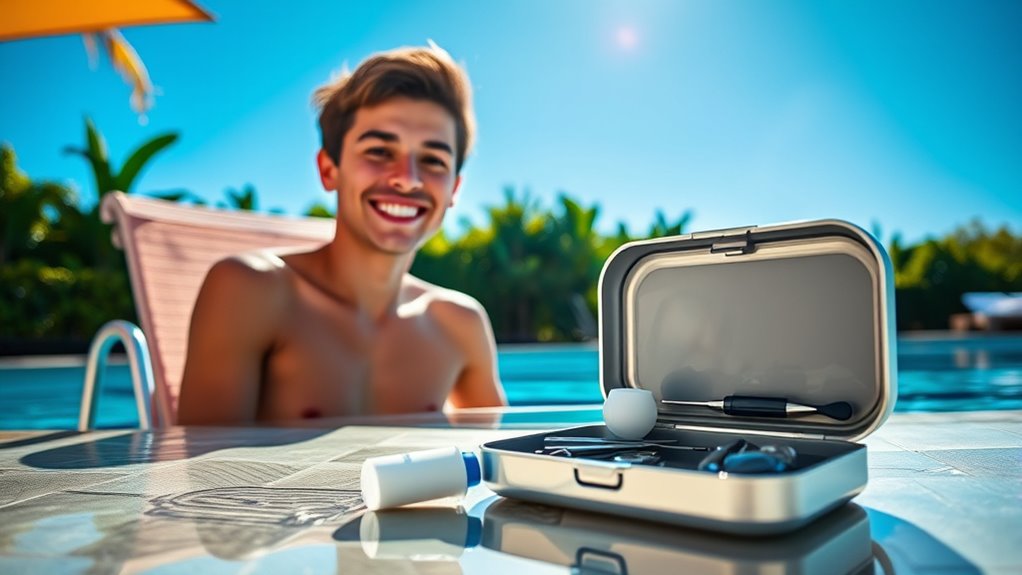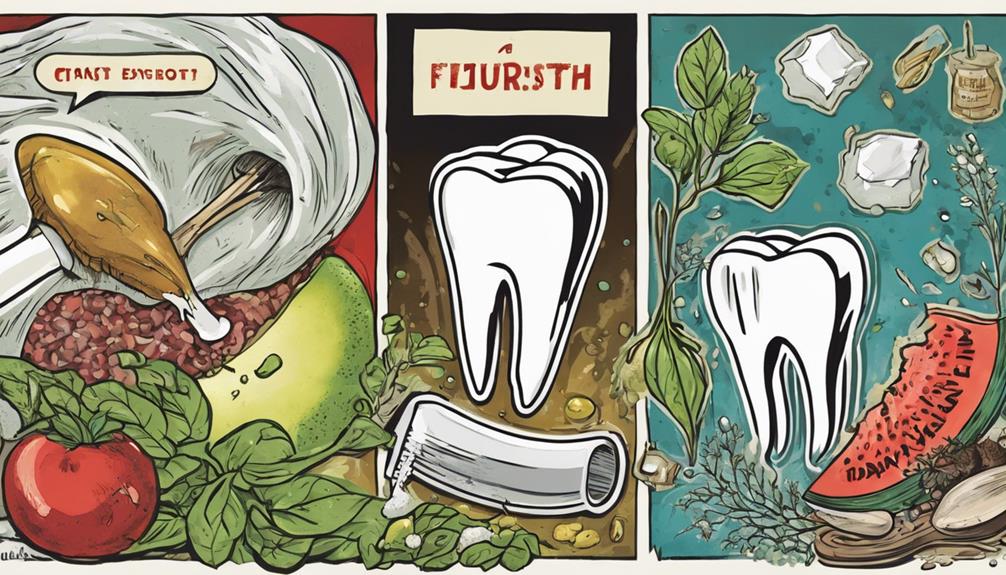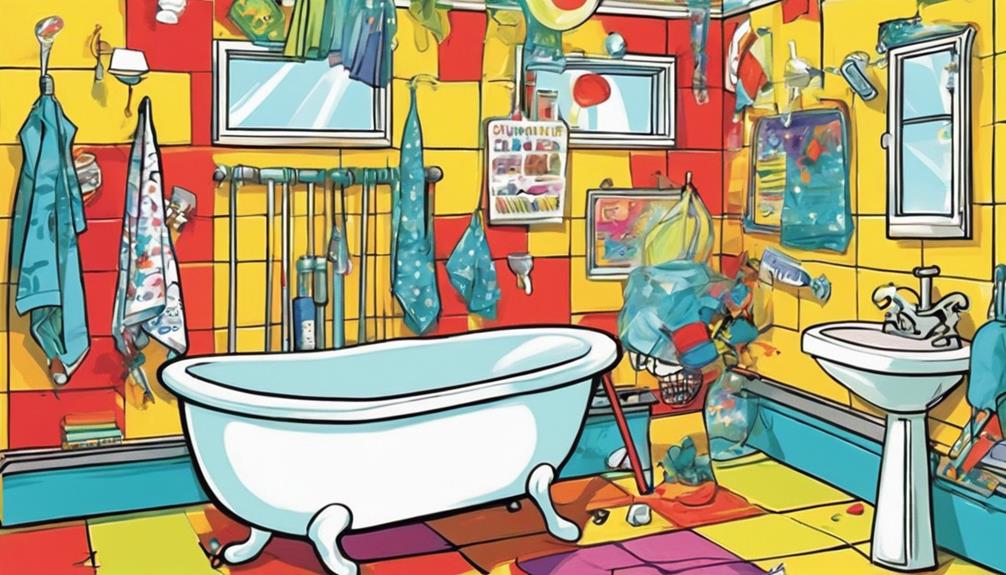If you chip a tooth poolside, stay calm and assess the injury carefully. Rinse your mouth gently with warm water to clean debris, control bleeding with gentle pressure, and preserve any broken fragments in saline or milk. Use cold packs to reduce swelling and consider over-the-counter pain relievers. To prevent further damage or infection, seek professional dental care promptly. Keep your injury manageable and then explore more tips to protect your smile.
Key Takeaways
- Remain calm, assess the injury, and seek professional dental care for severe damage or knocked-out teeth.
- Gently rinse mouth and tooth fragments with water; store broken pieces in saline or milk to keep moist.
- Use temporary dental cement to secure chips and relieve pain with cold compresses and over-the-counter pain relievers.
- Supervise swimmers and ensure pool safety to prevent injuries from slips, sharp edges, or water hazards.
- Maintain a hazard-free environment, use protective gear, and educate about safe behaviors to minimize chipped tooth risks.
Assessing the Damage and Staying Calm
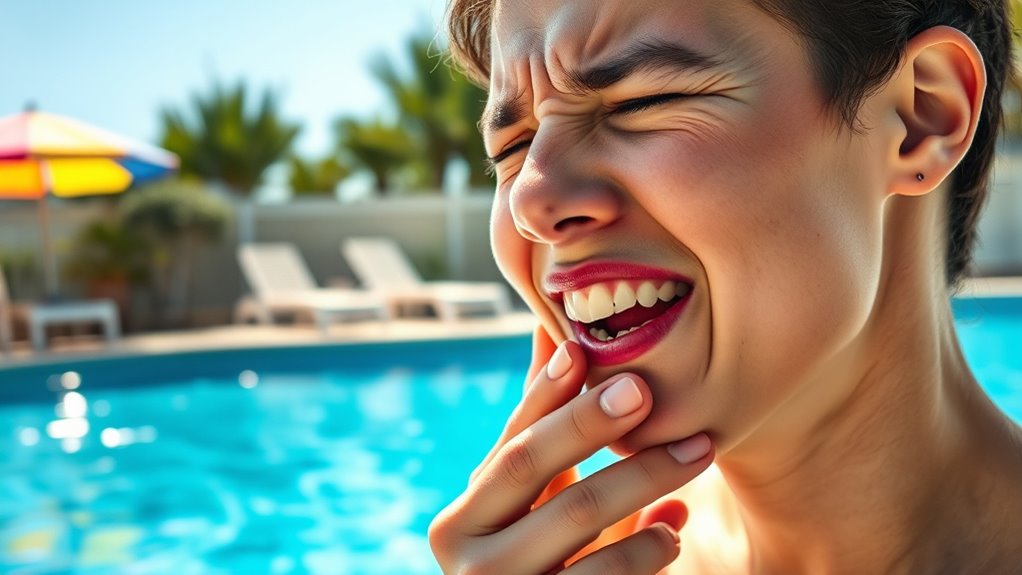
When a dental injury occurs at the poolside, it’s essential to stay calm and carefully evaluate the situation before taking any action. Your dental emergency preparedness can make all the difference, so assess the extent of the damage quickly. Check if a tooth is chipped, loose, or if there’s bleeding or pain. Remember to keep your movements gentle to avoid worsening the injury. Following pool safety tips, like avoiding rough play and wearing protective gear, can help prevent accidents. Stay focused on the injury’s severity—if the tooth is severely damaged or knocked out, seek professional dental help immediately. Remaining calm allows you to think clearly and act swiftly, reducing further damage and ensuring you’re prepared for the next steps. Additionally, understanding bioluminescent fungi can remind us of the importance of natural resilience and recovery in biological systems.
Rinsing Your Mouth and Managing Bleeding
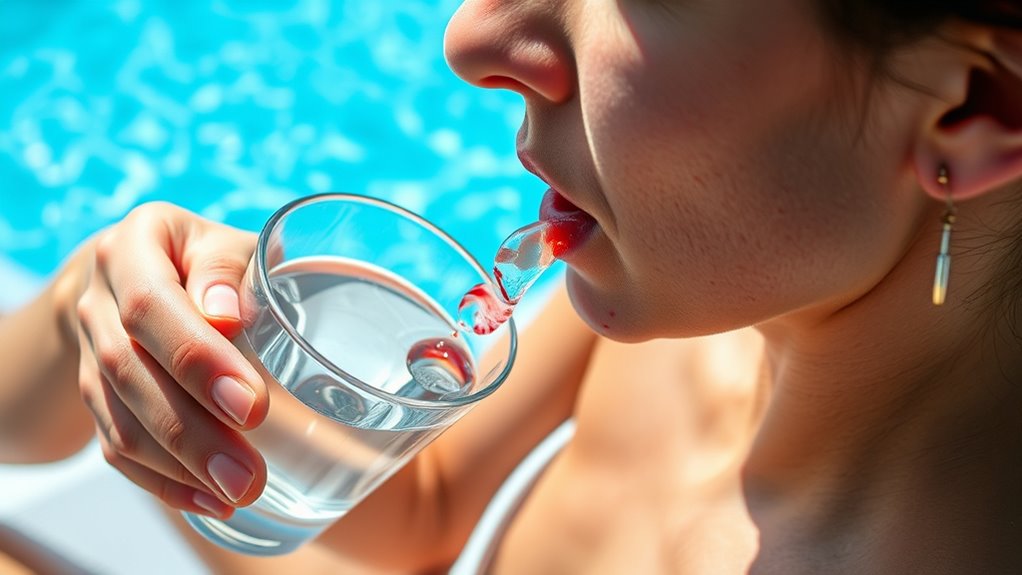
After evaluating the injury, the next step is to gently rinse your mouth with clean, lukewarm water. This helps remove debris and reduces the risk of infection, supporting overall pool safety and dental injury prevention. Be careful not to rinse too vigorously, as this could loosen any loose fragments. If you notice bleeding, apply gentle pressure with a clean cloth or gauze until it subsides. Keeping your head slightly elevated can help control bleeding and prevent blood from swallowing. Avoid using mouthwash or hydrogen peroxide, as they can irritate tissues. Staying calm and managing bleeding effectively can prevent further damage and ease discomfort until professional dental care is available. Proper rinsing and bleeding control are essential first steps after a chipped tooth incident. Additionally, understanding the importance of robotics integration in industries highlights how technological advancements are improving safety measures and emergency responses.
Preserving the Broken Tooth or Fragment
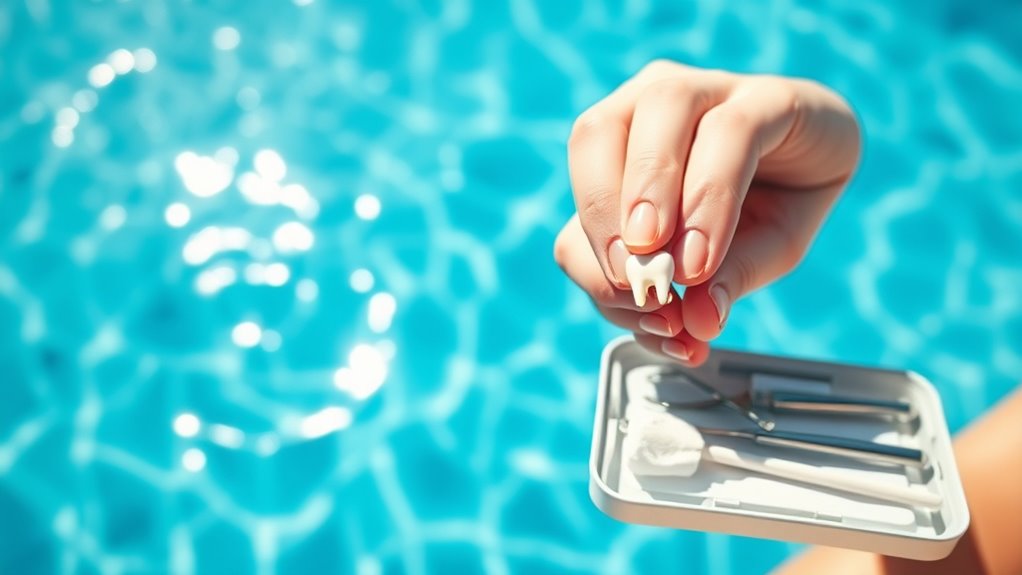
If you’ve broken a tooth or lost a fragment, rinse it gently with clean water to remove dirt. Store the piece in a saline solution or milk to keep it moist and prevent further damage. Handle the fragment carefully to avoid additional cracks or breaks. For best results, seek prompt dental care and consider modern dental materials that can aid in repair.
Rinse and Clean Immediately
Rinsing the broken tooth or fragment promptly is vital to prevent infection and preserve its integrity. Use clean, cold water to gently rinse away dirt, debris, or any pool water residue. Avoid scrubbing or using soap, as harsh cleaners can damage the tooth further. Good dental hygiene begins with careful cleaning, which helps minimize bacteria exposure and reduces the risk of infection. Remember, pool safety is essential—pool water can contain germs that may cause complications if not rinsed off quickly. By rinsing immediately, you help protect the tooth and improve the chances of successful reattachment or repair. Handle the fragment gently, keeping it moist and clean until you can see a dentist. Acting swiftly ensures you preserve as much of the broken tooth as possible. Additionally, understanding projector technology can help you make informed decisions about dental imaging devices in the future.
Store in Saline Solution
To keep the broken tooth or fragment in the best condition for possible reattachment, storing it in a saline solution is essential. Saline storage helps maintain the tooth’s moisture and prevents it from drying out, which is critical for tooth preservation. When you find the fragment, gently rinse it with clean water and immediately place it into a small container filled with saline solution. This keeps the tissue cells alive and ready for potential reattachment. Remember, swift action is crucial for the best outcome. Using a proper storage medium like saline is recommended over other liquids to ensure the best chances of successful reattachment.
- Use sterile saline solution, not tap water, for ideal tooth preservation
- Keep the fragment submerged at all times
- Avoid handling the broken piece with bare hands to prevent contamination
Handle With Care
Handling a broken tooth or fragment with care is essential to prevent further damage or contamination. When dealing with dental injuries poolside, avoid touching the broken piece with your fingers; instead, use a clean cloth or gauze. Store the fragment safely, ideally in a saline solution, to maintain its viability for dental repair. Remember, pool safety and swimming pool maintenance are vital—slippery surfaces can worsen injuries. For additional protection, consider using electric bikes with high-speed capabilities to quickly reach medical assistance if needed.
Applying Temporary Dental Repairs
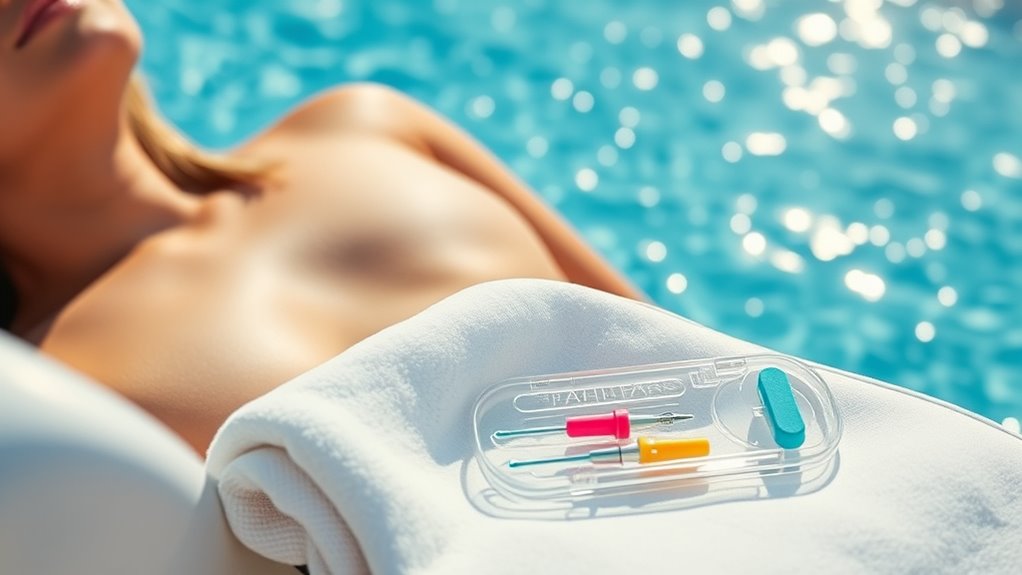
Start by carefully cleaning the chipped area with clean water to remove dirt and debris. Then, apply a temporary dental cement to hold the broken piece in place until you can see a dentist. This simple step helps protect the tooth and prevents further damage. Incorporating consistent messaging can also reassure the patient and reduce anxiety during the emergency.
Clean the Chipped Area
Before applying a temporary repair, it’s essential to thoroughly clean the chipped area to remove any debris, dirt, or blood. This ensures the repair adheres properly and reduces the risk of infection. Use a clean, damp cloth or sterile gauze to gently wipe the area. Avoid using harsh chemicals or alcohol, as they can irritate the tissue. Remember, during pool safety and swimming hazards, quick action is crucial—delays can worsen injury or lead to infection. Additionally, understanding proper self watering plant pots can help in maintaining healthy environments that promote healing.
- Remove all visible dirt and blood for better adhesion
- Use gentle pressure to avoid further damage
- Ensure the area is dry before applying any temporary fix
Cleaning the area carefully helps prevent complications and prepares it for an effective temporary dental repair.
Use Temporary Dental Cement
Once the area is clean and dry, you can apply temporary dental cement to restore the chipped tooth. This temporary cement is designed for quick, effective dental repair and is available at most drugstores. Start by following the instructions on the packaging—usually, you’ll knead the cement until it’s soft, then shape it into a small, thin layer. Carefully place the cement over the chipped area, ensuring it covers the damage completely. Gently press it into place to secure the repair. Avoid using too much, as excess can cause discomfort. Once set, the temporary cement will hold the chipped portion in place until you can see a dentist. This simple step helps protect the tooth and reduces sensitivity until professional treatment is available.
Managing Pain and Discomfort
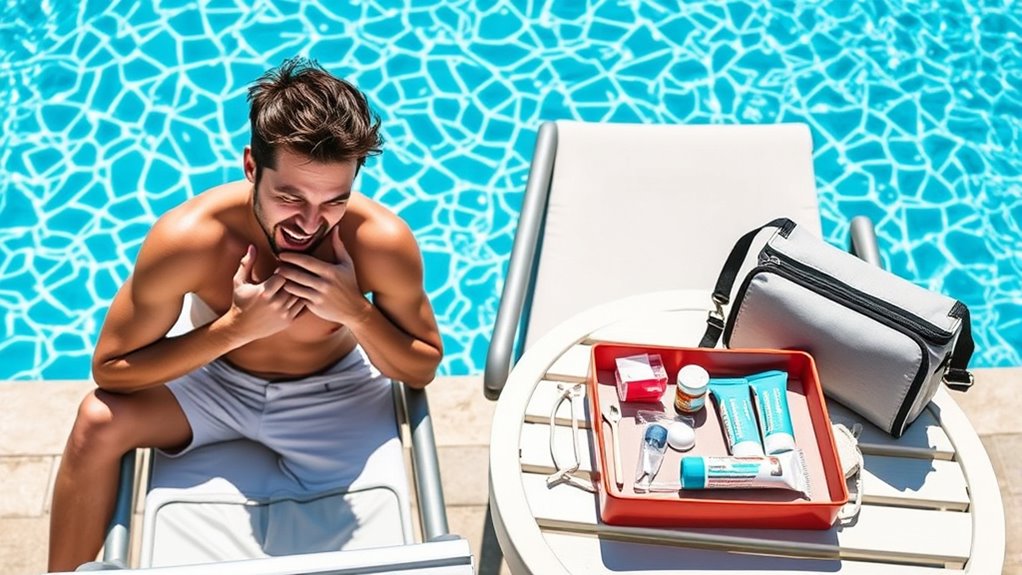
When you experience dental pain or discomfort after a swimming pool incident, managing it promptly can prevent further complications. To ease pain, start by rinsing your mouth with warm water to remove debris. Applying a cold compress to your cheek can reduce swelling and numb the area, providing pain relief. If dental anxiety is a concern, stay calm and breathe deeply to stay relaxed. Over-the-counter pain relievers like ibuprofen or acetaminophen can help, but follow dosage instructions carefully. Remember, effective pain management is essential for comfort and preventing infection. Using a cold compress or ice pack for swelling, taking recommended pain medication as needed, and staying calm to reduce anxiety can all help manage discomfort. Additionally, understanding the importance of proper wound care can aid in quicker recovery.
When to Seek Immediate Dental Care
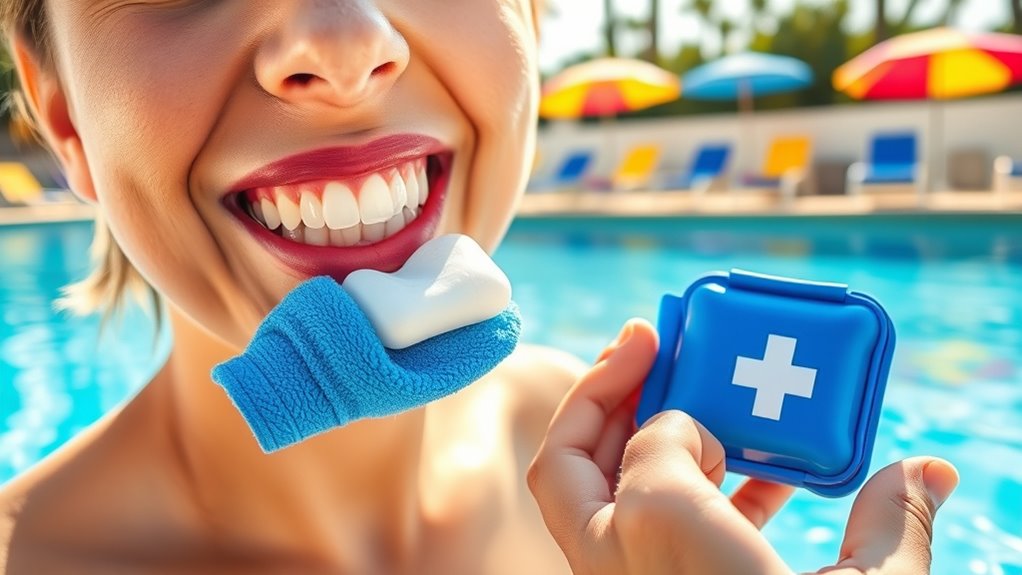
If your dental discomfort persists despite initial home care or worsens over time, it’s a clear sign you need to seek immediate dental care. Pool safety is vital, especially when swimming or playing near the pool, as chipped teeth can result from accidents caused by slippery surfaces or rough pool edges. Poor swimming pool maintenance can increase hazards, making injuries more likely. Don’t ignore severe pain, bleeding that won’t stop, or if the chipped tooth is knocked out or loose. Prompt dental attention is necessary to prevent infection or further damage. If you experience these symptoms, visit a dentist immediately. Acting quickly ensures proper treatment, reduces complications, and helps you get back to enjoying your time poolside safely. Ensuring a digital-friendly environment at home can also be beneficial in educating children about safety measures around water and digital devices.
Tips to Prevent Future Poolside Dental Injuries
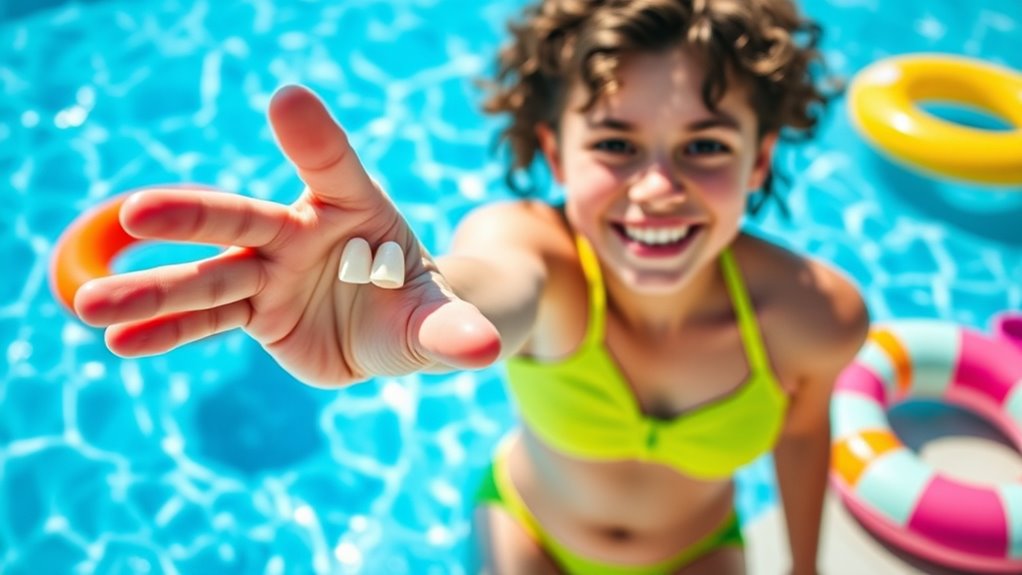
To prevent future poolside dental injuries, taking simple precautions can make a significant difference. Prioritize pool safety by always supervising swimmers, especially children. Ensure proper swimming pool maintenance to keep the area free of hazards like loose tiles or sharp edges. Wearing a mouthguard when jumping into the pool or engaging in active water sports provides added protection. Additionally, be cautious around pool equipment and diving boards to avoid accidental falls or collisions. Regularly inspect the pool area for potential dangers, and educate everyone about safe behaviors. These steps help minimize risks, reducing the likelihood of dental injuries and ensuring everyone enjoys the pool safely. Remember, prevention is key to maintaining a fun and injury-free swimming environment.
Frequently Asked Questions
Can a Chipped Tooth Heal on Its Own Without Dental Intervention?
A chipped tooth usually won’t heal on its own through natural healing or enamel regeneration. When you chip a tooth, the damage extends beyond the surface, and the enamel can’t repair itself like other tissues. Without dental intervention, the chip might worsen, increase sensitivity, or cause further decay. It is crucial to see a dentist promptly to assess the damage and prevent complications, rather than relying on natural healing alone.
Are There Home Remedies to Strengthen Teeth Against Future Poolside Injuries?
You might wonder if natural remedies or dietary supplements can help strengthen your teeth against future poolside injuries. While they can’t prevent all damage, eating a balanced diet rich in calcium and vitamin D supports strong teeth. Incorporate dietary supplements if necessary, but always consult your dentist first. Maintaining good oral hygiene and avoiding sugary foods also helps keep your teeth resilient and less prone to chips or cracks.
How Long Can a Chipped Tooth Remain Untreated Before It Causes Complications?
A chipped tooth is like a ticking time bomb—you shouldn’t ignore it. If you leave it untreated, you risk tooth discoloration, which can stain your smile, and gum irritation, leading to infections. Usually, you should see a dentist within a few days to prevent complications. The longer you wait, the more likely you are to face pain, sensitivity, and costly repairs down the line. Don’t delay—timely care keeps your smile safe.
What Types of Dental Damage Require Emergency Treatment Immediately?
You should seek emergency treatment immediately if you experience severe dental nerve pain, a jaw fracture, or a knocked-out tooth. These signs indicate significant damage that could worsen without prompt care. A damaged dental nerve can cause persistent pain and infection, while a jaw fracture needs urgent stabilization. Don’t delay—quick action prevents further complications and preserves your dental health. Always prioritize emergency care when facing these serious dental injuries.
Is It Safe to Swim With a Temporary Dental Repair in Place?
Did you know that swimming with a temporary dental repair is generally safe if you follow proper pool precautions? While your dental safety depends on the type of repair, it’s best to avoid rough water or diving immediately after treatment. Always check with your dentist first, as they can advise if swimming is secure for your specific situation. Taking these steps helps protect your smile and ensures a safe pool experience.
Conclusion
Remember, over 30% of dental injuries happen during sports or recreation, many near water. Staying calm and acting quickly can save your chipped tooth and reduce pain. Keep a dental emergency kit handy, and don’t delay seeking professional care if needed. By knowing these poolside first aid tips, you’re better prepared to handle surprises and protect your smile. Your quick response can make all the difference—so stay safe and keep smiling!
